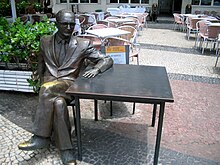Ary Barroso
Ary Evangelista Barroso (born November 7, 1903 in Ubá , Minas Gerais , † February 9, 1964 in Rio de Janeiro ) was a lawyer, sports reporter and one of the most popular Brazilian composers and singers of the 1940s and 1950s.
Life
Barroso studied classical piano and as a young man played in dance orchestras in Rio de Janeiro. In order to earn money for his marriage, he composed the song "Dá Nela" and applied it to the song festival for the Carnival 1930 in Rio, which was organized by the record company Casa Edison . The song won first prize and Barroso subsequently became a regular composer for Carnival marches and sambas . He wrote hundreds of sambas and ballads, many of them explicitly for the singer Carmen Miranda .
His compositions established the subgenre of Samba-Exaltação, a patriotic-exalting variant of Samba, which was promoted by the then ruling Vargas dictatorship as a contrast to Samba-Malandro of the red light districts and idleness. In 1939 Barroso composed his best-known title " Aquarela do Brasil ", which in the abbreviated form "Brazil" became world famous and experienced countless vocal and instrumental interpretations. Walt Disney heard the song on a visit to Brazil in 1941 and decided to incorporate the title in the animated film Saludos Amigos ( Three Caballeros in Samba Fever , 1942). He promptly earned Barroso an Oscar nomination in 1944 . Another Oscar nomination came in 1945 for the song Rio de Janeiro from the film Brazilian Serenade .
Disney invited Barroso to Hollywood , but Barroso declined the offer. Yet he delivered for Disney Another musical material, including the title of "Baía" (also called "Bahia" original: Na Baixa do Sapateiro ) and "Os Quindins de Yaya" for the animated film The Three Caballeros ( Three Caballeros , 1944) (from Carmen Miranda's younger sister Aurora Miranda sang). This title was also used instrumentally by many artists, u. a. from the orchestras Werner Müller and Xavier Cugat , and vocal, a. a. interpreted by Bing Crosby and Caterina Valente .
As a sports reporter, Barroso became famous not only for his eloquence, but also because he commented on the games of his favorite club Flamengo Rio de Janeiro with unheard of partisanship. This culminated in the fact that once during the game he left the reporter's booth and stopped commenting to celebrate a Flamengo goal with the team on the lawn. Another time he broke off the comment in the middle of an attack by an opposing team and instead said: " It's best not to look at all ". Ary Barroso justified the rejection of the Disney offer with the fact that there was no CR Flamengo in Hollywood.
Barroso died of cirrhosis of the liver on Carnival Monday 1964, while the Império Serrano samba school entered the Passarela do samb a (the 600 meter long sambodromo) with his work “Aquarela do Brasil”.
Web links
- Ary Barroso in the Internet Movie Database (English)
- English internet presence about the composer Ary Barroso with pictures and texts
- Ary Barroso discography with lyrics
Individual evidence
| personal data | |
|---|---|
| SURNAME | Barroso, Ary |
| ALTERNATIVE NAMES | Barroso, Ary Evangelista (full name) |
| BRIEF DESCRIPTION | Brazilian composer and singer |
| DATE OF BIRTH | November 7, 1903 |
| PLACE OF BIRTH | Ubá , Minas Gerais , Brazil |
| DATE OF DEATH | February 9, 1964 |
| Place of death | Rio de Janeiro , Brazil |
